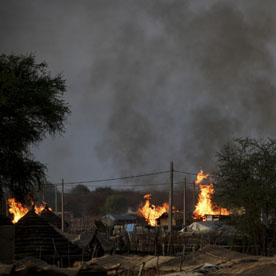Sudan on the brink: up to 80,000 flee Abyei
Just weeks before Sudan’s partition, up to 80,000 people flee Abyei after it was seized by the North. The UN’s Force Commander in Sudan tells Channel 4 News of his “great concern” at the suffering.
Ahead of Southern Sudan’s formal separation from the rest of the country, the Northern army have taken control of the disputed oil-rich border territory of Abyei, referred to some as the “Jerusalem” of Sudan because of its reputation as a flashpoint for conflict.
According to Southern Sudanese authorities, President Omar al-Bashir, who is already being investigated for war crimes in Darfur, is now moving thousands of Arab herdsmen south into Abyei, backed by Sudanese army troops.
The monitoring organisation Satellite Sentinel Project, set up by Hollywood star and Sudan activist George Clooney, said the north Sudanese armed forces appeared to have gathered heavy armour and artillery around El Obeid, about 270 miles north of Abyei.
John Prendergast of the Enough Project, which supports Sentinel, said the imagery showed the Sudanese government “is prepared to intensify military operations in Abyei and along the contested border, where most of Sudan’s oil lies”.
President Bashir is accused of forcibly displacing people of Dinka origin, traditionally supporters of the South.
Khartoum has defied calls from the international community to withdraw following days of clashes, including the use of heavy artillery in civilian areas.
The fighting is threatening to tip Sudan back into a civil war that had consumed the country for 22 years, killing 2 million people.
Under a 2005 peace deal that allowed southerners to vote overwhelmingly for independence in a referendum in January, Abeyei was supposed to have a referendum to decide its fate, but that hasn’t happened, fuelling tension in the region.
What I can say is – in conflicts, people suffer. Major Obi, Force Commander UNMIS
According to the UN, the latest violence has caused 40,000 people to flee Abyei, but Southern officials say 80,000 people have become refugees.
Major General Moses Bisong Obi, the Force Commander of the United Nations Mission in Sudan (UNMIS), told Channel 4 News he was “greatly concerned for the people who are displaced, that is our main priority here, protecting those forced from their lands.
“I am also very worried about the use of heavy artillery, there have been clashes and bombings, and this is never good.”
He said he had seen no evidence of killings but his forces have seen “widespread looting and burning of houses, we have seen milita activity in the region, and I cannot tell you much but what I can say is – in conflicts, people suffer.”
But Daniel Bekele, a researcher for Human Rights Watch, feared atrocities are taking place.
“We know from the past that militias are not respecters of human rights at all, they have no accountability, no rules of engagement, and no command structure,” Bekele said.
“The army are working hand in hand with the militas, like a hand and glove, and the Dinkas are the enemy. It really is very alarming,” he continued.
“It is possible this could expand, I hope it doesn’t, but it certainly has the potential to undermine the whole peace process,” Bekele added.
The number of people killed is not yet known, but Bekele said he was urgently trying to answer questions about the level of militia activity, and other flashpoints along the border.
Preparing for war?
Salva Kiir, the South Sudanese leader stressed he had no intention of going to war with the North.
“We will not go back to war, it will not happen,” Kiir said on Thursday in his first public statement since the conflict began.
“We are committed to peace,” he added.
“People on the ground tell me that the south’s soldiers, the Sudan People’s Liberation Army, are positioning themselves to fight. In January, people were full of hope, but now the fear is that independence celebrations will be swiftly followed by war,” she writes.
Read more: The history we're missing, stories from Africa

The US Special Envoy to Sudan from 2006-2007, Andrew Natsios, believes Khartoum’s aggressiveness is a timely gamble.
“Abyei has the only major oil fields that the north would control after the south secedes – that is, of course, if Khartoum prevents it from joining the south,” Natsios said.
“At the same time, Khartoum is watching as U.S. and NATO forces are increasingly tied up in Libya, which means that the West is especially unlikely to take any sort of unified military action against the land grab in Abyei,” he continued.
The diplomat also thinks the Arab Spring in North Africa has affected President Bashir’s actions during the crisis:
“The Arab revolt has simultaneously terrified Bashir’s party and given it hope.
“Just a year ago, Khartoum was surrounded by secular Arab states – Egypt, Libya, Tunisia, and Yemen – that were hostile to Bashir’s ideological allies, the Muslim Brotherhood.
“Now, Khartoum’s Islamists believe that if they can survive in power a few more years, their neighbours may be led by the Brotherhood or similar groups, making for a much friendlier environment,” he said.
Southern Sudan is due to declare its independence on July 9th.
-
Latest news
-
‘I violated my moral compass working for Trump,’ former lawyer testifies3m

-
Working class creatives in film and TV at lowest level in decade5m

-
Israeli police investigating attack on Gaza aid convoy4m

-
Biden announces major tariff increase on Chinese-imported green tech3m

-
‘If NHS can afford it, people with obesity should have Semaglutide,’ says weight loss expert5m

-




